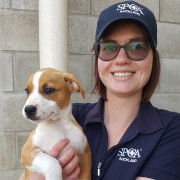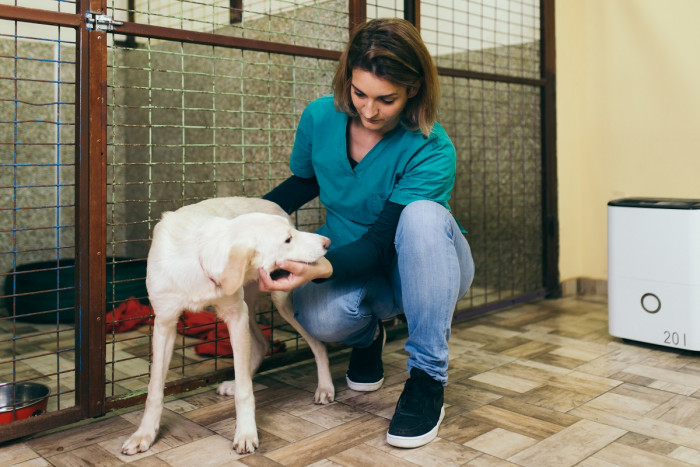Animal Care Attendant
Kaitiaki Kararehe
Animal care attendants care for, and clean up after animals in places like kennels, pet shops and animal shelters.
Pay
Animal care attendants usually earn
$24 per hour
Senior animal care attendants usually earn
$25-$26 per hour
Source: Wellington Institute of Technology, 2019.
Job opportunities
Pay
Pay for animal care attendants varies depending on their qualifications, experience, and how many hours they work. Nearly half of animal care attendants work part time.
- Animal care attendants usually earn the minimum wage.
- Senior animal care attendants who work as managers usually earn $25 to $26 an hour.
Source: Wellington Institute of Technology, 2019; and careers.govt.nz research, 2019.
- PAYE.net.nz website - use this calculator to convert pay and salary information
- Employment New Zealand website - information about minimum wage rates
(This information is a guide only. Find out more about the sources of our pay information)
What you will do
Animal care attendants may do some or all of the following:
- clean and maintain animal enclosures
- feed, bathe, groom, and exercise animals, and check their behaviour and health
- treat animals for minor injuries and illnesses under veterinary supervision
- help with animal training and research
- keep records and carry out office work.
Depending where they work, animal care attendants may also:
- serve customers
- supervise volunteers
- collect payments
- keep accounts and stock records.
It’s not just about the animals – a lot of the job involves working with people too, sometimes in emotional situations.

Freyja Knewstubb
Canine Enrichment Co-ordinator
Skills and knowledge
Animal care attendants need to have:
- skill in handling and training animals
- knowledge of animal diseases and care
- an understanding of the Animal Welfare Act.
Working conditions
Animal care attendants:
- may work regular business hours, or part time, or on contract. They may work shifts, including nights, weekends and public holidays
- work in catteries, kennels, animal shelters, and other places that house animals
- work in conditions that can be dirty and smelly, with stressed or diseased animals, and outside in all weather conditions
- may travel locally to pick up or deliver animals.
What's the job really like?

Freyja Knewstubb
Canine Enrichment Co-ordinator
How did you get into animal care? Were there any barriers?
"I’ve been obsessed with dogs since I was a kid, so going into animal care was a natural move for me. I moved from Wellington to Auckland to pursue my degree in animal welfare and management, and volunteered at an animal shelter throughout.
"When I graduated I took a short-term contract in the marketing department, then later got into the canine team – looking after and training dogs, and dealing with people who want to adopt them.
"It took a few tries before I managed to land the role working with animals, but I got there in the end."
What do you like about your job?
"I love working to build relationships with the dogs that need more time to trust humans. Helping them is the most rewarding part of my job."
What are the challenges of your job?
"Finding a good work-life balance can be hard at times. I often end up bringing the dogs home with me – mentally and sometimes physically – so I have to work hard to compartmentalise and make sure I have down time."
Is it true that your job involves a lot of cleaning?
"A lot of cleaning is involved, which seems to surprise people! It's not a glamorous job but it's a lot of fun!"
Animal care attendant video
Cynthia talks about her role as a kennel hand at Waglands Dogs' Holiday Grooming Retreat – 2.07 mins.
So a typical day would be starting at 7.30am, getting the dogs out into their playgroups, into the yards so that they can toilet, and play and have a good time for the morning.
So while they’re doing that we are back in the kennels and we’re doing all the cleaning. So we’re cleaning up all the poos and wees and checking bedding, making sure that everything is clean and dry, refreshing water. We’ll pooper scoop. So once all the dogs come back in, we go back out and make sure the yards are clean, and then we start all over again.
It’s a noisy environment, so we need to be able to manage that. The more trustworthy and reliable and hardworking you are, the more responsibility you’re given and you can move on to different things within the business.
You have to be really dedicated and committed to the dogs and to their welfare – looking after them.
So sometimes you have to be a quick thinker in that not all dogs like each other. It’s good to be able to read the signs and to step in, and think quickly – change the situation before it escalates. So that’s really important, whether that’s taking a particular dog out of the yard, putting a dog into time out or just making sure they’re all getting on well.
Not every dog initially is going to be happy to be in this environment, particularly if they’re a new dog. So you have to be quite patient, and learn to get to know the dogs as individuals and what they like and what they don’t like.
I come from a background of working with animals. I have worked in a pet shop. I’ve always had lots of animals at home, and I’ve done some volunteer work for the SPCA, so I had a good general background. Have as much to do with animals as you can. Working for the SPCA, or HUHA or the zoo – whatever it is that interests you.
We all love dogs. Everybody who works here loves dogs. It is a big part of our day, having cuddles. Sometimes we quite often say, when mum and dad come to pick the dogs up, “We’ll keep her if you like!”
Entry requirements
There are no specific requirements to become an animal care attendant as you gain skills on the job.
However, some employers prefer you to have:
- a driver licence
- a qualification in animal care and welfare such as a New Zealand Certificate in Animal Care (Level 3) with strands in Companion Animals, Equine, and Rural Animals. This qualification will be offered from 2023.
Secondary education
No specific secondary education is required for this job, but science subjects and English are useful.
Personal requirements
Animal care attendants need to:
- care about animals and be confident working with them
- be excellent communicators, as they may have to deal with people in stressful situations, and handle conflict
- be calm and reliable
- be quick-thinking and able to follow instructions
- be able to work well alone and in a team.
You need to be flexible, confident, and able to work well under pressure.
Freyja Knewstubb
Canine Enrichment Co-ordinator
Useful experience
Useful experience for animal care attendants includes paid or volunteer work with animals.
Physical requirements
Animal care attendants need to have a good level of fitness, as they may need to do a lot of walking.
They must also be strong, as they need to lift heavy animals and equipment.
Check out related coursesWhat are the chances of getting a job?
Animal care attendant turnover high, but competition strong
Animal care attendant vacancies come up regularly because people often leave the job after a short period. This is due to low pay and almost half the jobs available being part time.
However, competition for jobs can be strong, as many people want to work with animals.
According to the Census, 804 animal care attendants worked in New Zealand in 2018.
Volunteer work is a useful start
Your chances of securing an animal care attendant job are best if you've volunteered at a place like an animal shelter.
Summer, when most kittens are born, is a good time to look for a temporary job.
Qualifications can help you get a job and a higher wage
A qualification in animal care may help you secure a job as an animal care attendant, and negotiate a higher wage.
Types of employers varied
Animal care attendants may work for:
- kennels, catteries and dog daycare centres
- animal shelters, welfare and rescue centres
- pet stores and veterinary practices
- aquariums, aviaries, nature reserves and wildlife sanctuaries
- animal control and dog-training facilities
- pet transport companies.
Sources
- Bullot, L, animal care team lead, Society for the Prevention of Cruelty to Animals (SPCA) Newtown Wellington Centre, careers.govt.nz interview, June 2019.
- Ministry of Business, Innovation and Employment, '2006-2014 Occupation Data' (prepared for Careers New Zealand), 2015.
- Patel, D, programme manager, health and social services, WelTec, careers.govt.nz interview, June 2019.
- SPCA website, accessed June 2019, (www.spca.nz).
- Stats NZ, '2018 Census Data', 2019.
(This information is a guide only. Find out more about the sources of our job opportunities information)
Progression and specialisations
Animal care attendants may progress to set up their own business, such as a dog-walking service or animal day care, or move into management.
With further training, animal care attendants may progress to become veterinary nurses or zookeepers.
Animal care attendants may specialise in caring for specific animals such as cats, dogs, rabbits or fish.
Last updated 25 March 2025

